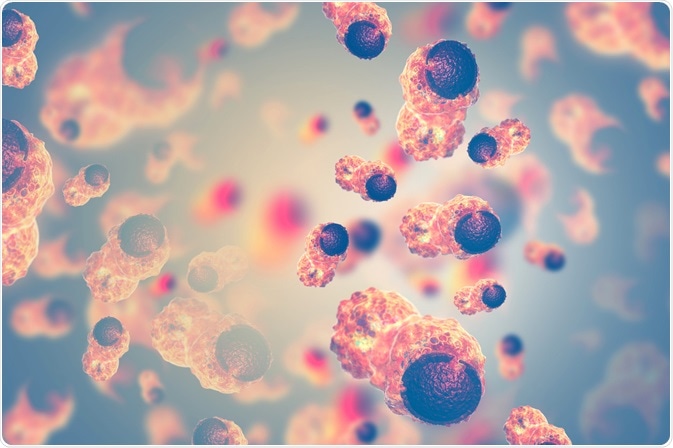When the cells in the body start to grow abnormally out of control, it leads to cancer. The body cells that are nearest to the malignant portion get affected and, from there, spread to other locations. From the primary site, the tumor advances to other parts of the body called the metastatic site.
The type of cancer is determined by the initial site of occurrence, irrespective of the area to which cancer has spread. For instance, even when cancer in the lungs has progressed to the liver, it is called lung cancer. In a few cases, the primary site of the cancer is not known and cancer has already become metastatic; this is classified as a cancer of unknown primary (CUP) or an occult primary cancer. This occurs in a few situations.

Image Credit: crystal light / Shutterstock
Primary Categories of CUP
Even though the primary site of the CUP is difficult to decide by the oncologist, further study of the cancer will help to detect its origin. By examining the cancer cells through a microscope, the oncologist can ascertain that the cancer belongs to one of the following types.
- Adenocarcinomas: Cancers that develop from gland cells are known as adenocarcinomas. Nearly 6 out of 10 CUP cases are adenocarcinomas. Often the initial site of the cancer occurs in the lungs, pancreas, breast, prostate, stomach, liver, or colon.
- Poorly differentiated carcinoma: Sometimes, cancer cells do not develop in enough detail to identify the cancer type. About 10% of these CUP cases are detected to be lymphoma, melanoma, or sarcoma.
- Squamous cell cancer: In this type of cancer the cells are flattened like skin cells or cells on the lining of some organs.
- Poorly differentiated malignant neoplasm: Cells of this type are positively cancerous, but they are extremely aberrant to find the cancer type or part of the body where they occurred initially.
- Neuroendocrine carcinoma: Cancer in the neuroendocrine system turns the cells into nerve cells and hormone-secreting cells. They are spread all over the organs such as the esophagus, stomach, pancreas, intestines, and lungs.
Causes for Unknown Primary Cancer
CUP comprises many types of cancers, where each one is caused due to a variety of reasons; hence, it is very difficult to state a specific cause for CUP.
Cancer is actually caused because of a genetic change in the DNA of a cell, with each cell consisting of a DNA molecule that provides genetic information and instructions for cell growth and its functions. There are particular genes to regulate cell functions like their growth, multiplication, and death. The genes that boost cell division and increase the lifespan of cells are termed oncogenes, and those that decelerate the cell division and assassinate the cells at a specific situation are known as tumor suppressor genes. Genetic mutations in these genes can cause cancer. However, cancer does not occur due to a single mutation, but requires multiple numbers of genetic changes.
CUP and its Symptoms
The symptoms of CUP differ in each person and are based on the site from where they have spread, but some of these are listed below:
- Firm enlarged lymph nodes with no pain.
- A lump in the abdomen that can be viewed externally or early satiety.
- Dyspnea
- Chest and abdominal pain
- Bone pain
- Skin cancer
- Fatigue or weakness
- Loss of appetite or unexplained weight loss.
The occurrence of these symptoms does not always confirm the presence of CUP cancer. It is necessary to consult the physician regarding the symptoms as they may be caused due to some other health disorders.
Tests for CUP
A course of tests is carried out by the physician in order to better characterize the cancer. Of the series of tests, an autopsy is the most significant method in which a small portion of tissue or segment is collected from the metastatic site and analyzed under a microscope. If the physician is not able to identify the type of cancer, additional tests have to be carried out.
Various methods of biopsy are available. In a few cancers, a biopsy is not achievable as the cancer may be hard to reach or the patient can be seriously ill not suitable to collect the malignant tissue. CT, MRI, and ultrasound scans are also done to detect such cancers.
Treatment Options for Unknown Primary Cancer
After cancer detection, the team of oncologists will talk over with patients about the possible therapeutic care that suits them. Selecting a treatment procedure is very crucial and hence, it is necessary to decide without any haste.
The therapeutic care is based on:
- the site of the cancer;
- the metastatic condition of the cancer;
- the primary site of the cancer;
- the abnormality and irregularity of cells viewed under a microscope;
- physical health and fitness of the patient;
- individual choices.
Further Reading
Last Updated: Apr 8, 2021